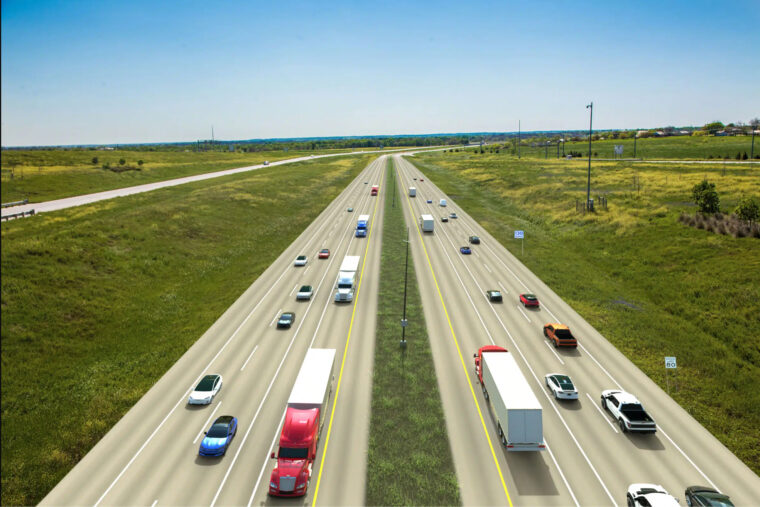
A highway in Central Texas will soon be transformed into a smart freight corridor with sensors, cameras, radar and other technology that paves the way for driverless trucks and autonomous vehicles to travel safely.
The Texas Department of Transportation recently awarded a $1.4 million contract to Cavnue, a developer of smart roads, to install the technology along SH 130 located west of Austin. Cavnue’s technology will provide real-time information for connected and automated vehicles (CAVs) on road conditions that can help response times for incidents or alert vehicles of traffic slowdowns and hazardous conditions.
Construction will start in May on an initial 3-mile segment, and completion on the entire 21-mile section will wrap up in late spring 2025. As part of its contract, Cavnue will develop a deployment and evaluation plan to install the technology hardware and provide data services, a Cavnue spokesperson told Government Market News.
Most drivers won’t notice a difference on the roadway as the technology will be built on poles adjacent to medians and shoulders, TxDOT Austin Deputy District Engineer Mike Arellano said. TxDOT uses similar technology for cameras and sensors on other major highways to note any issues on road signs.
“Many cars and trucks on the roads today have varying levels of connectedness and automation, and we expect that these features, which help to make roadways safer for everyone, will continue to advance and accelerate,” Arellano said in an email.
Making the connection
Cavnue’s technology will essentially create a digital model of the highway. TxDOT will analyze and share that data with self-driving and passenger vehicles that also have similar technology, according to TxDOT. The system will use edge and cloud computing and machine learning so CAVs can receive information directly instead of through another device.
Because the technology will be subtle, TxDOT won’t have to create a dedicated lane for any self-driving trucks or modify the existing highway.
“Trucking is core to the Texas economy, and SH 130 has become one of the most important trade corridors in the country, driving the economic boom currently underway in Central Texas,” Cavnue co-founder and CEO Tyler Duvall said in a news release. “By collaborating with TxDOT, we are ensuring that the state’s roadways keep up with vehicle innovations and advance Texas as a hub for testing, investments and deployments in self-driving vehicle technology.”
Long term, Texas is already planning for more CAVs on its highways. In 2019, Gov. Greg Abbott directed TxDOT to create a CAV Task Force to study implementing technology statewide.
The task force is looking at options for different types of vehicles with automated technology. Connected vehicles can send and receive information via other systems outside the vehicle, while automated vehicles can drive without human intervention but not independently. Autonomous vehicles can drive to a set destination and make decisions without human intervention, according to TxDOT.
Several pilot programs for various types of CAVs are already underway in Texas, including between Dallas and Houston. The state is also looking for opportunities to expand the CAV technology to other highways, said Arellano, the TxDOT deputy district engineer.
To make autonomous and other forms of CAV driving possible, the task force noted in a white paper that TxDOT should consider developments other than technology infrastructure to advance CAVs in the state. This includes building transfer hubs for CAV trucks in the right of way along highways. The automated trucks would then carry freight between the hubs.
The task force also noted the importance of continuing to support automated freight by developing a transportation network to support new technology. The state’s task force is heavily focused on the 865-mile central triangle of the state bordered by I-35, I-45 and I-10, called the Texas Connected Freight Corridor. TxDOT aims to continue partnering with public and private stakeholders to continue developing and implementing CAV technology.
“Through this project [with Cavnue], we are testing this exciting technology and verifying the safety and efficiency benefits it can create for all road users,” Arellano said.
All news and information on this site is provided by the team at Strategic Partnerships, Inc. Check out this short 1-minute video that provides a quick overview of how we work with clients.
Photo courtesy of Cavnue
The post Texas takes steps toward highway corridor for self-driving trucks appeared first on Government Market News.
